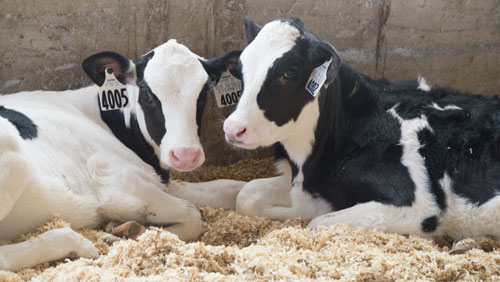
by Amanda Smith, Associate Editor
Dehorning ranks relatively low on the list of tasks dairymen enjoy. Selective mating for polled cattle eliminates this need. However, the polled Holstein sire population, as well as those populations in other breeds, is miniscule compared to their horned counterparts. Their use also comes with a slight hit to the herd's genetic base.
In December 2010, one active Holstein polled bull and 13 genomic bulls were enrolled with NAAB (National Association of Animal Breeders). By August of 2013, polled Holstein numbers rose to six active and 68 genomic bulls. Similar trends are apparent for Jerseys.
Researchers from Iowa State evaluated the impact of three polled genetics' strategies on overall herd genetic merit. The percentage of polled calves born over a 10-year period and the resulting net merit predicted transmitting ability (NM PTA) for three scenarios:
- Various percentages (30, 50, 73 or 100 percent) of horned cows were randomly mated to Pp bulls in which half the offspring will be polled
- Various percentages of horned cows were preferentially mated to Pp bulls
- Horned cows were selectively mated to PP bulls (all polled offspring); heterozygous cows to Pp bulls and homozygous polled cows to horned bulls
After 10 years of using only PP Holstein bulls, the average NM PTA of cows would be approximately 62 percent of that from a system using horned bulls. The use of Pp bulls would alleviate some of this loss in genetic merit, with at least 75 percent of the NM PTA retained.

with NAAB is shown for active (A) and genomic (G) bulls.
A more minimal impact was seen in Jersey herds. The NM PTA for cows was set at 122. For horned and Pp Jersey bulls, these numbers were 542 and 502; a $40 trade-off.
The frequency of polled genetics, noted the authors, will rise slowly as polled bulls that fit existing selection criteria are used. While this can be easily accomplished by mating cows to homozygous polled bulls (PP), the availability and genetic merit of these bulls limit the cost-effectiveness of this approach.








